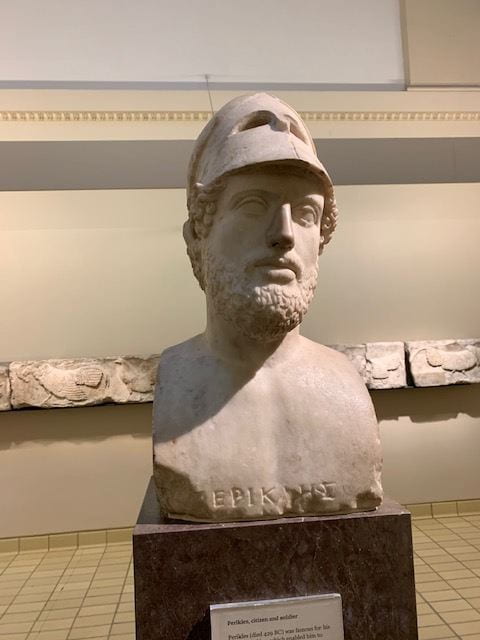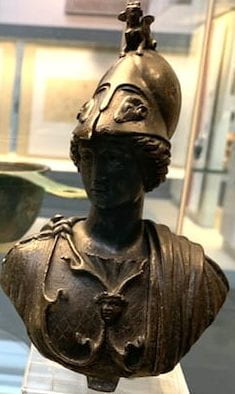Lysistrata: Reminding Athens How it Got its Name
Tad Niewiadomski
War affects everyone, and that is a universal truth that every culture has had to learn. Men may be the ones who traditionally fight in war, but as history has shown, it takes all members of the community, home and away, to win a war. All feel the effects of war. While the role of women has grown considerably since the First World War and has been much more closely studied, there were no wars in history in which women did not play a vital role. Even ancient Greek warfare, so enamored with its ideals of masculinity, cannot hide the efforts of women from our modern eyes.
The most recent object of study in our CIV program was a play called Lysistrata, written in Athens during a massive conflict known as the Peloponnesian War. Although this play was, in its day, a comedy not meant to be taken seriously, it nevertheless reveals several enduring truths about the roles women play in war that not even the staunch patriarchal Athenians could hide from themselves.

To supplement our reading of the play, our class took a trip to the British Museum, where we had the opportunity to look at artifacts from the time of the play’s authoring in order to better understand the Greek understanding of war and gender. When it came to war, most images were of men with weapons and armor stoically attacking each other in some glorified conflict. However, the piece that stood out to me the most was that of a bust of the Athenian statesman Pericles. To me, this piece serves as a crystallization of what the Greeks saw in the intersection between politics, war, and manhood. He is (literally) stone faced, wearing a large beard as well as a warrior’s helmet. This is the sort of person a Greek would identify as a warrior and a leader. Many men in Greek art are portrayed this way. In the same room, art depicting women was often as part of a mirror or some cosmetic device, and often played to the virtues of motherhood or warmth. Admirable in their own way, but not that which would define a warrior or a leader. It is for that reason that I find the figure of Athena so curious.

Another artifact I found on my walk through the museum was this bust of the goddess Athena. I think the figure of Athena says some things about the nature of war that the Athenians knew very well but didn’t necessarily want to outright admit. Just at a glance, the way Athena is depicted is about identical to the way Pericles is depicted, so the pieces of art are designed to say similar things about either figure. Athena is a wise goddess, and is often the cool and strategic counterpart to Ares’s angry and violent way of war. It’s also very worth mentioning that the city of Athens itself gets its name from Athena, and the great temple at the acropolis is dedicated to Athena. So obviously, this female war goddess plays an important role in the Greek understanding of war, and that is something I think Aristophanes gets across in Lysistrata. While it is a comedy, all great comedy is rooted in some fundamental truth and often has an intelligent and poignant message to get across. Given the Athenian setting and prominent role of the temple of Athena in the play, I don’t think the parallels between the character Lysistrata and Athena are accidental. One of the central gags is that the men, so often considered to be the level-headed and virtuous ones, are driving their nations to ruin with their ignorance are are quite literally being lead around by their carnal desires once they lose access to sex. At the same time, although it may have been parody, Lysistrata’s virtue and skill as a tactician cannot be denied. Obviously, Lysistrata does not suggest that armies should be led by women, but I think it’s a call to listen to the wisdom of women when the wisdom of men begins to fail. When women speak out during times of war, it’s often for a good reason, but men have a hard time understanding as war affects women in a way men can’t know. Furthermore, especially during long conflicts like the one that was ongoing at the time of this play’s writing, men can easily get lost in a war of diminishing returns and mutually assured destruction. Women play a vital role in recognizing when a conflict becomes irrational, as when the home starts to erode become of war they are the first to feel the effects. Remembering the guidance of Athena, Lysistrata provides a good laugh while reminding the men of Athens not to forget their namesake.





